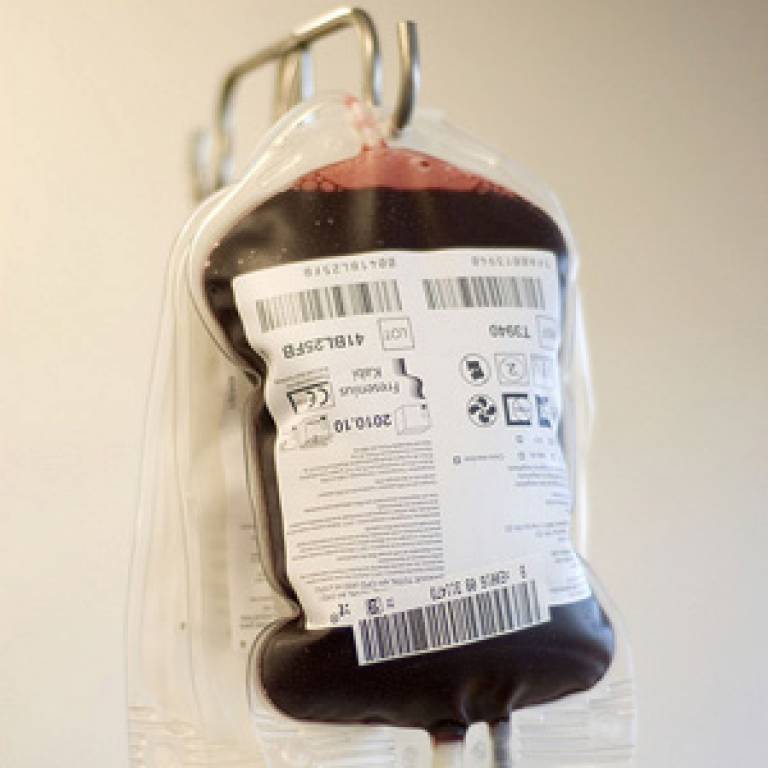UCL awarded £4.2 million for stem cell transplantation and immunotherapy
4 November 2014
UCL has been awarded £4.
 2 million from the National
Institute for Health Research (NIHR) to fund a Blood and Transplant Research
Unit for stem cell transplantation and immunotherapy, due to launch in October
2015.
2 million from the National
Institute for Health Research (NIHR) to fund a Blood and Transplant Research
Unit for stem cell transplantation and immunotherapy, due to launch in October
2015.
All human blood cells begin as haematopoietic stem cells,
and these can be used to develop treatments for genetic disorders and cancers
that affect the blood. Haematopoietic stem cell transplants are often the only
way to treat such diseases, but they carry significant risks. Following
transplants, patients can suffer cancer relapse, infections or
graft-versus-host disease, where immune cells in the donor blood attack the
patient's body.
The new unit will aim to minimise these risks by developing techniques to identify more appropriate blood donors, remove the immune cells that attack patients but not those that fight infection, and genetically modify immune cells to target cancer cells. The unit will also develop ways to use patient's own cells in treatments, avoiding the need for transplantation altogether and potentially offering new treatments for a wide range of human cancers.
The unit will be a Centre of Excellence in human experimental medicine related to blood and transplantation with a strong focus on getting real benefits to patients. The NIHR-funded research unit will support the delivery of objectives and functions of NHS Blood and Transplant by creating an environment where world-class research, focused on the organisation's needs, can thrive. By providing high quality research evidence, the work of the centres will help to inform NHSBT's decision making.
This work has the potential to impact on thousands of patients with either inherited genetic disorders or cancers and to rapidly transition new technologies and scientific knowledge into NHS Transplant services
Dr Karl Peggs
Professor Dame Sally Davies, Chief Medical Officer and Chief Scientific Adviser at the Department of Health, said: "The NHS and its patients rely on an efficient supply of blood and organ donations and, increasingly, stem cells and genomics. We want researchers to explore how to improve the quality and effectiveness of these donations, therapies and technologies. The NIHR Blood and Transplant Research Units will involve NHSBT in partnerships with leading university teams so that we can accelerate and translate advances in research into benefits for donors and patients."
Dr Lorna Williamson, Medical and Research Director at NHS Blood and Transplant said: "I am delighted that the Department of Health, through the NIHR, continues to recognise the importance of blood and transplantation research. This funding supports ambitious experimental research projects that will inform future clinical practice for services that NHS Blood and Transplant provides to the NHS and beyond."
Dr Karl Peggs, Reader in Stem Cell Transplantation and Cellular Immunotherapy at the UCL Cancer Institute said: "We are delighted to have secured this award to host the NIHR Blood and Transplant Research Unit for Stem Cell Transplantation and Immunotherapy, in concert with our colleagues at the Institute of Child Health and NHS Blood and Transplant. We are at an exciting time in the development of novel and effective gene and cell therapies, and the work of this unit will allow us to further develop and refine these therapies, and also to focus on developing the infrastructure to allow broader availability across the country. This work has the potential to impact on thousands of patients with either inherited genetic disorders or cancers and to rapidly transition new technologies and scientific knowledge into NHS Transplant services."
The Unit will operate across multiple sites, co-ordinated at the UCL Cancer Institute, in collaboration with King's College London and Queen Mary University of London. Two other units are also due to open at the University of Cambridge and University of Newcastle, focusing on organ donation and transplantation and donor health and genomics.
Links
-
UCL Cancer Institute
- Dr Karl Peggs' academic profile on IRIS
- National Institute for Health Research
- NHS Blood and Transplant
Image
- Fresh blood (Courtesy of César Astudillo on Flickr)
 Close
Close

